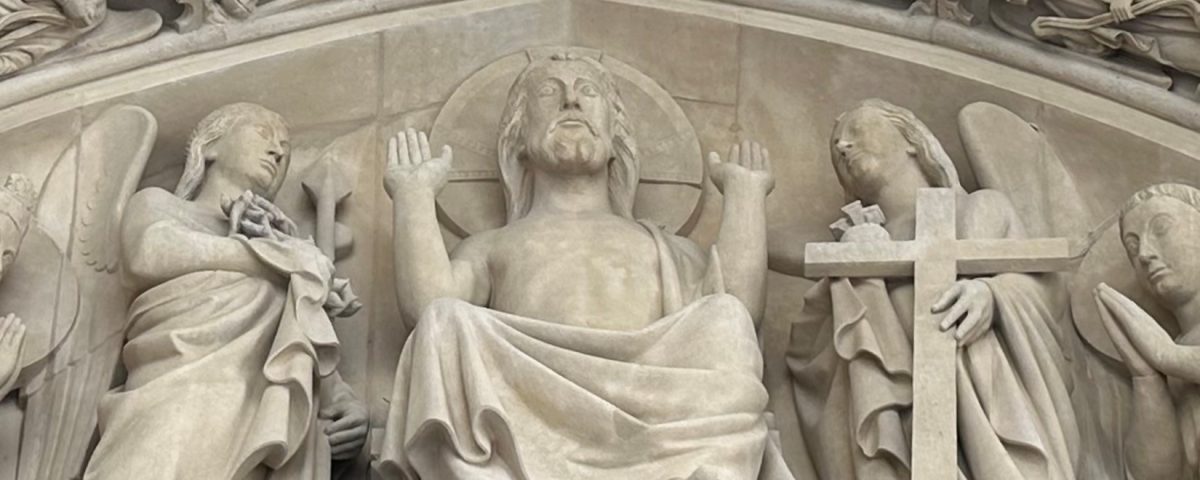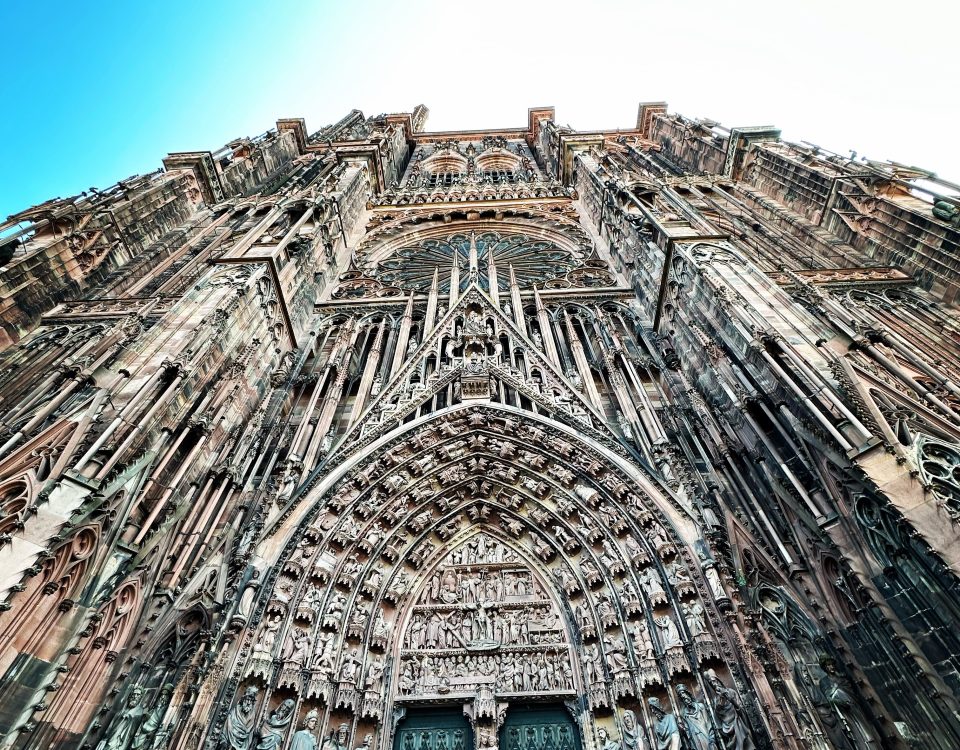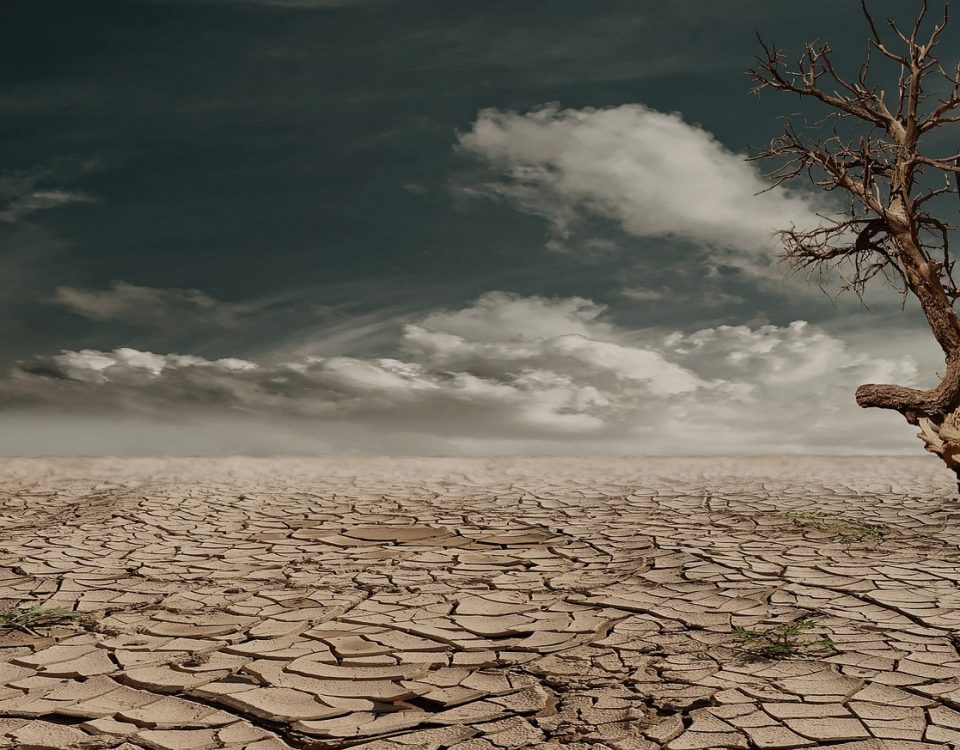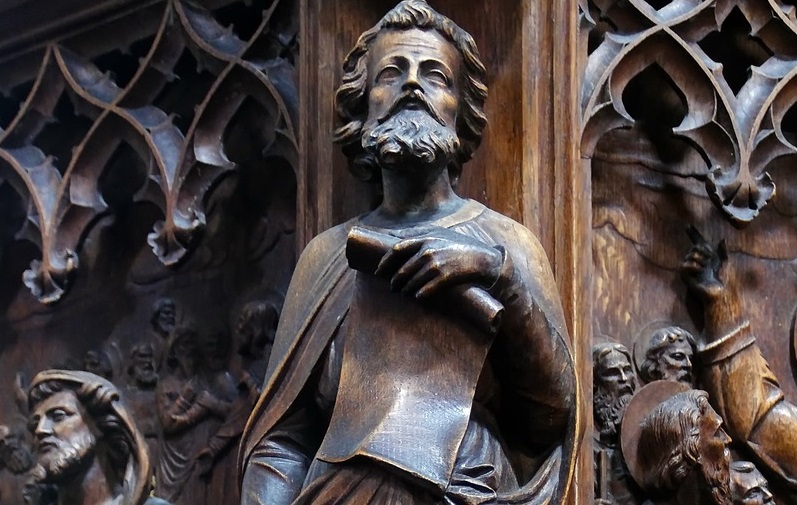The thing is, you see, is that heaven is closer than we think. Hell too—as unnerving as that may sound.
Everything is closer; that’s what you discover when you begin to see things spiritually. All this stuff we talk about, sing about, pray about: it’s all quite close to us, all of it behind a thin veil, not distant at all. It is a reality that, once spiritually perceived, can be either quite comforting or quite discomforting, depending on the state of one’s soul—because, of course, of the judgement; for that too is closer than we think.
Forgive me, to speak plainly: What I mean is that when we think of things like heaven or hell or the judgement, we tend to think in linear and historical terms—in terms of the past, the present, and the future—and so we tend to think the judgement is far away, heaven too and hell if we fear it. And so—further—again, if we’re still worried about such eternal things, we tend to think we have time to worry about them—thinking them matters we can consider later—because we don’t think them things in the present; they are only things we need worry about in the future, we tend to think, because we think in linear and historical terms. If I’m worried about hell, for example, I can tend to think I have time to mend my ways because hell is in the future; it’s not anything that bothers me now. When we think of heaven, we often think in terms also of space, not just time; heaven is thought to be somewhere far away, nowhere close at all. This, of course, is why we find in literature and mythology so many stories about pilgrimages, journeys, and quests; even Jesus used spatial imagery—of exodus and of going to prepare a place.[1] Paul too: “then comes the end,” he writes to the Corinthians.[2] Because we seem culturally to think about eternity and eternal things in this way; we think they are things “at the end” of time. If you’ve watched Loki (which I recommend), all the characters find themselves at some point in the “Void” at the end of time; that’s often how we think of time—that it runs in a line.
But the thing, as I said, is that that’s not the only way to think of these eternal things—as if they are far away or far into the future, on a line. Rather, it is possible to think of time and eternity as layered realities, not linear. That is, it’s possible to see things spiritually—or, what the Fathers often meant when they talked about seeing things spiritually—seeing things like the judgement and heaven and hell not as far away things but as realities that are very close, as things strangely in the present—mystically, spiritually. Again, not to geek out too much this morning, but there is something quite spiritually analogous between the way the Fathers talked about time and eternity and the way time is played with and bent in many of the Marvel movies—in the “multiverse.” If you’ve not watched any of these movies or if you hate them like Martin Scorsese does, I apologize for the reference, but some of you will get it. My point is simple, and it’s an ancient and Christian point: and that is to perceive spiritually, to see things spiritually, one will see that heaven and earth are very close to one another, time and eternity too, and hell and judgement too—frightening, as I said. None of it is far away, not even God. But, as I said, this is a matter of spiritual perception—and science fiction too, I suppose—both beautiful arts of the human soul.
Now again, forgive me, to speak plainly: The point I am trying to make is that to understand the Scripture, to understand the Mass or Christian worship at all or to understand God, one must begin to see things spiritually in just this manner—seeing things like heaven and hell and judgement and God as realities not far away at all but close. The liturgy—pay attention to the words of the prayers of the Mass; sometimes our language slips into a contemporaneousness with heaven. “And so, with Angels and Archangels…”—that’s what we say after we’ve lifted up our hearts.[3] That’s what happens in the Mass, we Catholics believe: the past and the future come together into a mystical now. We sing with the angels; the body of Christ is present; we’re in the upper room and also at Calvary—all at the same time, as St. John Paul II put it, in a “mysterious oneness in time.”[4] That’s what the Mass actually accomplishes for those spiritual enough to understand—it tears the veil of the present to reveal the eternity of God and heaven. That’s why we sing “Holy, Holy, Holy…Heaven and earth are full of your glory,” because that’s what’s happening: heaven is breaking into our world.[5] That’s why we share the peace, because Peace has come. That’s why we say “Blessed are those called to the supper of the Lamb,” because it is the supper of the Lamb.[6] Again, I am speaking in spiritual terms, mystical terms; I understand there are some who don’t get this, for we do live in a banal age of screens; but you are not trapped.
Now the whole reason I bring this basic spiritual point up at all is because I want to talk about Christ the King and about this frightening passage from Matthew’s gospel. When the Church says Christ is king, is the Church talking only about the future or about the present as well? When the Church proclaims the parable about the Son of Man, turned a king, seated upon his throne to judge the wicked and the righteous, separating the goats from the sheep, is the Church thinking this is about some far-off judgement, something to happen only at the end of time? The parable itself suggests that God is present to us now in the least of these his brethren. As St. Augustine put it, “Christ is hungry here, thirsty here, he’s naked, he’s a migrant, he’s sick, he’s in prison.”[7] That seems to be the grace, but also the warning, of this parable: that God is closer than you think, the judgment too; and so, woe to those who refuse to see things spiritually, because it is a blindness, this parable suggests, leading to “eternal punishment”—a close thing as well, no doubt.[8]
But what does any of this mean—practically speaking—for you and me? It means that we have no excuse—in fact, it may even be quite dangerous—to delay acting like a Christian now, today, every day, at every moment. Because Christ and heaven and hell are closer than you think. St. Basil the Great once said, “Works of piety are an excellent burial garment.”[9] He was talking about the rich, about how they should do works of charity before they die and not wait until they’ve gone on to the Lord for judgement. The Church has always taken what we today call “legacy” gifts for its ministry and for the poor, always gratefully too; but the Church has also always praised more those who give to the poor while in the prime of their lives—those people become saints. The same goes for the rest of us in all areas of life; I’m not talking about money; that’s just an example. Rather, I’m talking generally about what it means to live truly as if Christ is king. It’s to live differently. It’s to not put off being a good Christian and a good Catholic any longer. It’s to begin to see Christ in the breaking of the bread and in the brother right next to you. It’s to begin heaven because you finally see how close it really is. Amen.
[1] John 13:1; 14:3
[2] 1 Corinthians 15:24
[3] The Roman Missal
[4] John Paul II, Ecclesia de Eucharistia 5
[5] The Roman Missal
[6] Ibid.
[7] Augustine, Sermon 137.2
[8] Matthew 25:46
[9] Basil the Great, To the Rich 9
© 2023 Rev. Joshua J. Whitfield










